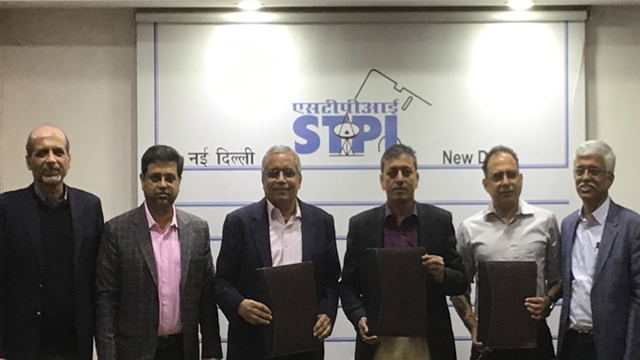India Electronics and Semiconductor Association (IESA), the premier industry body representing the Indian electronic system design and manufacturing (ESDM) space, signed a memorandum of understanding (MoU) with STPI and IIIT-Bhubaneshwar to establish the second ESDM Incubator in Bhubaneswar. Building on the success of the Electropreneur Park Delhi, this incubator will be housed at STPI Bhubaneshwar to nurture start-ups and help them scale up by providing access to funds, market and mentors.
The first Electropreneur Park housed at Delhi University has been operational for more than 2 years and has successfully incubated 22 companies with a combined market valuation of INR 150Cr. While India has seen a big spurt of software IT based start-ups in the past decade with unicorns of multibillion-dollar valuations, it is an acknowledged fact that the ESDM space is a much more difficult industry to succeed. The roadblocks for transforming a product idea in electronics into a successful business is different from other segments. While cutting edge technology is not readily available, the problem is compounded by lack of easy access to required tools, equipment for designing, testing, certifying and perfecting the product. This complexity adds to the cost of incorporation and product development of the start-up, which typically is at least 7x the cost of a typical software start-up.
The ESDM Incubators, in collaboration with Universities and with support from Government, alleviate these pain-points by providing access to technology and subsidizing the cost of access to tools and equipment used. The Electropreneur Park in Delhi has been able to successfully create models for such access and thus enable multiple start-ups to develop products in a range of sectors such as Electric Vehicles (EVs), charging stations for EVs, indoor air purifiers, smart hydroponics for indoor vegetable growth, low-cost medical electronics and low cost robotics kits for schools among others. Building on this success, the second ESDM Incubator at Bhubaneswar will be mentored by the Electropreneur Park, Delhi.
Dr Omkar Rai, Director General, STPI, said, “Software Technology Parks of India (STPI) has been the cornerstone of the IT growth story of India. Our facilities across the country helped the IT industry grow from strength to strength by providing seamless connectivity and policy incentives among others to the industry. In collaborating to establish the Electropreneur Park at Delhi with IESA & Delhi University, we have been able to develop a good model for supporting the electronics industry. Our vision is to create more such facilities across the country to support growth of the electronics industry, in a way similar to the IT industry. I’m very happy that we have joined hands again for the ESDM Incubator at Bhubaneswar and wish all partners great success.”
“We are delighted to associate with MEITY, STPI and IESA in setting up the Electropreneur Park. Initiatives such as these are gradual steps towards development of the ESDM ecosystem in the country. We are excited as this program provides significant opportunities and a conducive environment for our students to gain valuable experience and guidance in this space. We look forward to more such partnerships to help develop the ESDM ecosystem in India”, said Gopal Krishna Nayak, Director, International Institute of Information Technology, Bhubaneswar (IIIT – Bhubaneswar).
Rajesh Ram Mishra, President, IESA said, “We are excited that the Honourable Prime Minister has a clear vision to boost the ESDM ecosystem in the country. Our goal is to make India a design-led manufacturing hub by aiding the development of the ESDM sector in the country and placing entrepreneurs and businesses on a global platform. We are thrilled with the opportunities in this space and look forward to fructifying more such partnerships.
Industry Outlook
The demand for electronic products in India is expected to grow at a CAGR (compound annual growth rate) of 41 per cent during 2017-2020 to reach $400 billion by 2020. The domestic production which is currently growing at a CAGR of 27 per cent may touch $104 billion leaving a huge gap for import to the extent of $300 billion, according to the joint study brought out by ASSOCHAM and NEC. The demand for electronics hardware in the country is projected to increase from USD 20.6 billion in 2012 to USD 38.7 billion by 2019.



